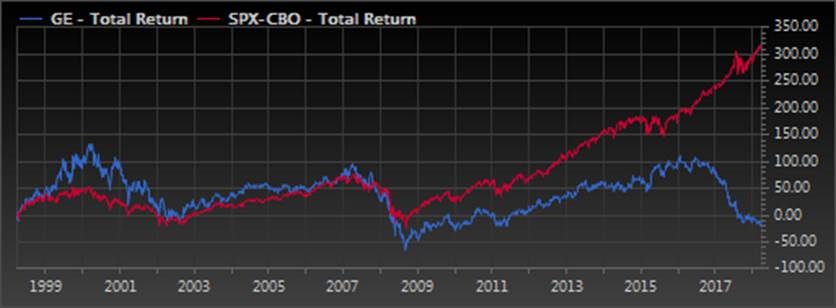General Electric's painful year as been a boon for investors who have placed big bets against the legacy industrial conglomerate.
And Wall Street's outlook for the company's fourth quarter isn't getting any rosier.
GE has proven to be this year's second-most profitable short trade, according to financial technology firm S3 Partners. It is the third most shorted stock in the worldwide industrial conglomerate sector, behind Toshiba and 3M.
Ihor Dusaniwsky, S3's head of research, estimates profits on the GE short to be $673 million this year, a 36 percent gain. A short sale involves selling borrowed stock, hoping it will fall in price so the stock can be returned later at a profit.
GE shares are on pace for their worst week of trading this year, down 6.4 percent, as the stock has been cut in half over the last 12 months.

Concern about a recent gas turbine failure in Texas has hung over GE. Several Wall Street analysts slashed their price targets following the new roadblock to GE's struggling power business, forecasting the stock to head even lower.
UBS cut its price target to $13 from $16 for GE shares, saying the business will likely "require even more aggressive cost reductions, force GE into a vicious cycle." J.P. Morgan brought its price target all the way down to $10 a share, saying the firm now assumes "weaker results at power and some franchise value impact" for GE.
Dusaniwsky said the company's stock drop over the past six months has been seen as a "death cross" by technical traders, who are seeing heavy selling by institutional investors. A death cross is a pattern that indicates the potential for a selloff. Meanwhile, the amount of money the shorts are betting against GE has increased 10 percent over the last month, bringing GE's total short interest to $1.36 billion, according to S3.
CEO John Flannery's turnaround plan for GE has yet to bear fruit. Flannery said during GE's second-quarter earnings in June that he had "essentially" completed the "target of $20 billion of dispositions" he promised. Despite the push to make GE leaner, the stock continues to struggle and the once giant of American industry is a fraction of what it was before the financial crisis.
GE was worth nearly $600 billion in August 2000 — a time when it was one of the most valuable companies in history. Its valuation slipped over the first decade of Jeff Immelt's tenure as CEO before taking a sharp hit during the 2008-2009 financial crisis. GE's value climbed back to as much as $300 billion by December 2015, yet shareholder confidence began eroding sharply in January 2017, when the stock was trading around $31..
Immelt's time leading the company was defined by an unwillingness to hear bad news, over a dozen insiders revealed to The Wall Street Journal earlier this year. He was criticized for unrealistic financial goals, poorly timed acquisitions and even mismanagement of the company's cash. Since January 2017, shares have fallen nearly 60 percent.
No comments:
Post a Comment